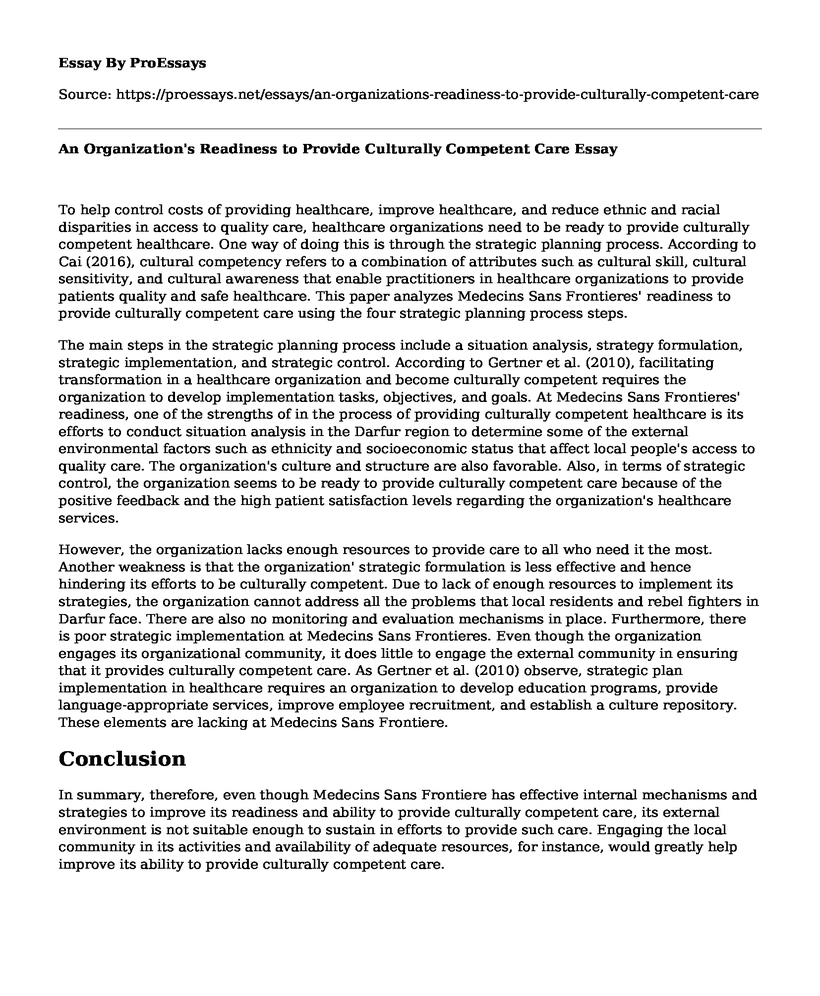To help control costs of providing healthcare, improve healthcare, and reduce ethnic and racial disparities in access to quality care, healthcare organizations need to be ready to provide culturally competent healthcare. One way of doing this is through the strategic planning process. According to Cai (2016), cultural competency refers to a combination of attributes such as cultural skill, cultural sensitivity, and cultural awareness that enable practitioners in healthcare organizations to provide patients quality and safe healthcare. This paper analyzes Medecins Sans Frontieres' readiness to provide culturally competent care using the four strategic planning process steps.
The main steps in the strategic planning process include a situation analysis, strategy formulation, strategic implementation, and strategic control. According to Gertner et al. (2010), facilitating transformation in a healthcare organization and become culturally competent requires the organization to develop implementation tasks, objectives, and goals. At Medecins Sans Frontieres' readiness, one of the strengths of in the process of providing culturally competent healthcare is its efforts to conduct situation analysis in the Darfur region to determine some of the external environmental factors such as ethnicity and socioeconomic status that affect local people's access to quality care. The organization's culture and structure are also favorable. Also, in terms of strategic control, the organization seems to be ready to provide culturally competent care because of the positive feedback and the high patient satisfaction levels regarding the organization's healthcare services.
However, the organization lacks enough resources to provide care to all who need it the most. Another weakness is that the organization' strategic formulation is less effective and hence hindering its efforts to be culturally competent. Due to lack of enough resources to implement its strategies, the organization cannot address all the problems that local residents and rebel fighters in Darfur face. There are also no monitoring and evaluation mechanisms in place. Furthermore, there is poor strategic implementation at Medecins Sans Frontieres. Even though the organization engages its organizational community, it does little to engage the external community in ensuring that it provides culturally competent care. As Gertner et al. (2010) observe, strategic plan implementation in healthcare requires an organization to develop education programs, provide language-appropriate services, improve employee recruitment, and establish a culture repository. These elements are lacking at Medecins Sans Frontiere.
Conclusion
In summary, therefore, even though Medecins Sans Frontiere has effective internal mechanisms and strategies to improve its readiness and ability to provide culturally competent care, its external environment is not suitable enough to sustain in efforts to provide such care. Engaging the local community in its activities and availability of adequate resources, for instance, would greatly help improve its ability to provide culturally competent care.
References
Cai, D. (2016). A concept of cultural competence. International Journal of Nursing Sciences,3(3), 268-273
Gertner, E.J., Sabino, J.N., Mahady, E., Deitrick, L.M., Patton, J.R., Grim, M.K., Geiger, J.F., & Salas-Lopez, D. (2010). Developing a culturally competent health network: A planning framework and guide. Journal of Healthcare Management 55(3): 190-204
Cite this page
An Organization's Readiness to Provide Culturally Competent Care. (2022, May 09). Retrieved from https://proessays.net/essays/an-organizations-readiness-to-provide-culturally-competent-care
If you are the original author of this essay and no longer wish to have it published on the ProEssays website, please click below to request its removal:
- Annotated Bibliography on Leadership
- Strategic Management for Mercedes Benz Paper Example
- Paper Example on RAMS Project Evaluation: Achieving Success Through Collaboration
- Paper Example on Assessing Health Risk for Patients
- Essay Sample on DaVita's Strategy: Attention to Detail, Teamwork and Compensation
- Paper Example on Nike: A Global Powerhouse in Sportswear Since 1964
- Paper Example on Leadership in Multigenerational Workforces: Bridging the Gap







